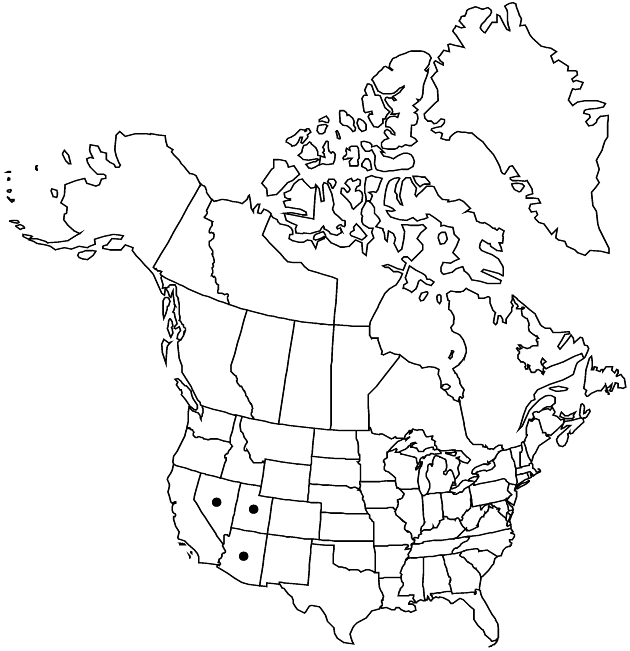Difference between revisions of "Xylorhiza tortifolia var. imberbis"
Brittonia 29: 211. 1977.
Common names: Smooth Mojave woody-aster
Basionym: Machaeranthera tortifolia var. imberbis Cronquist Leafl. W. Bot. 10: 12. 1963
FNA>Volume Importer |
FNA>Volume Importer |
||
| Line 11: | Line 11: | ||
|name=Machaeranthera tortifolia var. imberbis | |name=Machaeranthera tortifolia var. imberbis | ||
|authority=Cronquist | |authority=Cronquist | ||
| + | |rank=variety | ||
|publication_title=Leafl. W. Bot. | |publication_title=Leafl. W. Bot. | ||
|publication_place=10: 12. 1963 | |publication_place=10: 12. 1963 | ||
| Line 29: | Line 30: | ||
|elevation=600–1900 m | |elevation=600–1900 m | ||
|distribution=Ariz.;Nev.;Utah. | |distribution=Ariz.;Nev.;Utah. | ||
| − | |discussion=<p>The geographic distribution of < | + | |discussion=<p>The geographic distribution of <i></i>var.<i> imberbis</i> usually follows the canyons of the Colorado River of Utah and adjacent Arizona at least to Toroweap Point; it also occurs in Clark and Nye counties, <i>Nevada</i>, where it intergrades with <i></i>var.<i> tortifolia</i> (A. Cronquist 1994).</p> |
|tables= | |tables= | ||
|references= | |references= | ||
| Line 38: | Line 39: | ||
-->{{#Taxon: | -->{{#Taxon: | ||
name=Xylorhiza tortifolia var. imberbis | name=Xylorhiza tortifolia var. imberbis | ||
| − | |||
|authority=(Cronquist) T. J. Watson | |authority=(Cronquist) T. J. Watson | ||
|rank=variety | |rank=variety | ||
| Line 53: | Line 53: | ||
|publication year=1977 | |publication year=1977 | ||
|special status= | |special status= | ||
| − | |source xml=https://jpend@bitbucket.org/aafc-mbb/fna-data-curation.git/src/ | + | |source xml=https://jpend@bitbucket.org/aafc-mbb/fna-data-curation.git/src/eaa6e58056e40c9ef614d8f47aea294977a1a5e9/coarse_grained_fna_xml/V19-20-21/V20_936.xml |
|tribe=Asteraceae tribe Astereae | |tribe=Asteraceae tribe Astereae | ||
|genus=Xylorhiza | |genus=Xylorhiza | ||
Revision as of 19:31, 16 December 2019
Stems, leaves, and involucres glabrous, stipitate-glandular. Leaf margins sparsely piloso-villous to puberulent. 2n = 12.
Phenology: Flowering Apr–May(–Jun).
Habitat: Sandy or gravelly slopes and flats, in pinyon-juniper, sagebrush, and blackbrush zones
Elevation: 600–1900 m
Distribution

Ariz., Nev., Utah.
Discussion
The geographic distribution of var. imberbis usually follows the canyons of the Colorado River of Utah and adjacent Arizona at least to Toroweap Point; it also occurs in Clark and Nye counties, Nevada, where it intergrades with var. tortifolia (A. Cronquist 1994).
Selected References
None.
Lower Taxa
None.